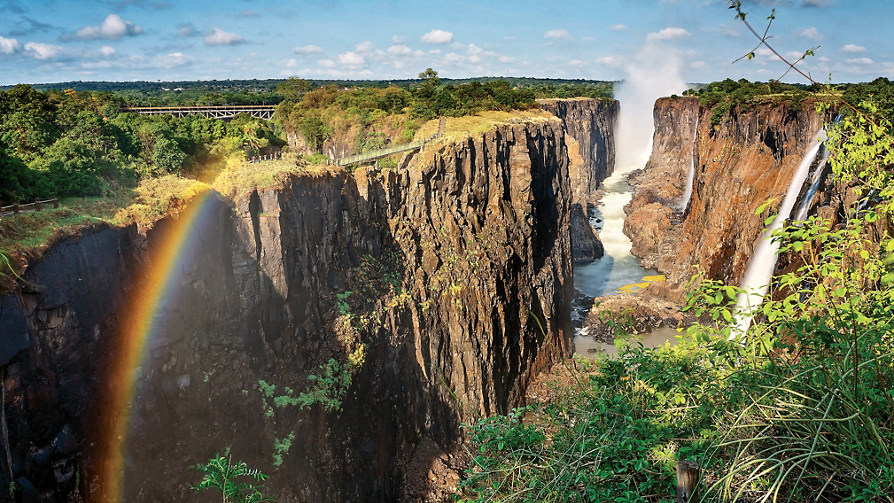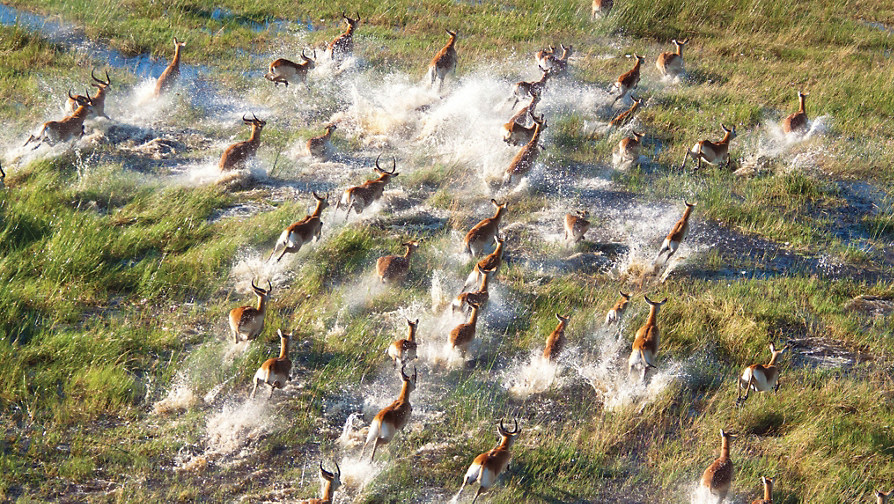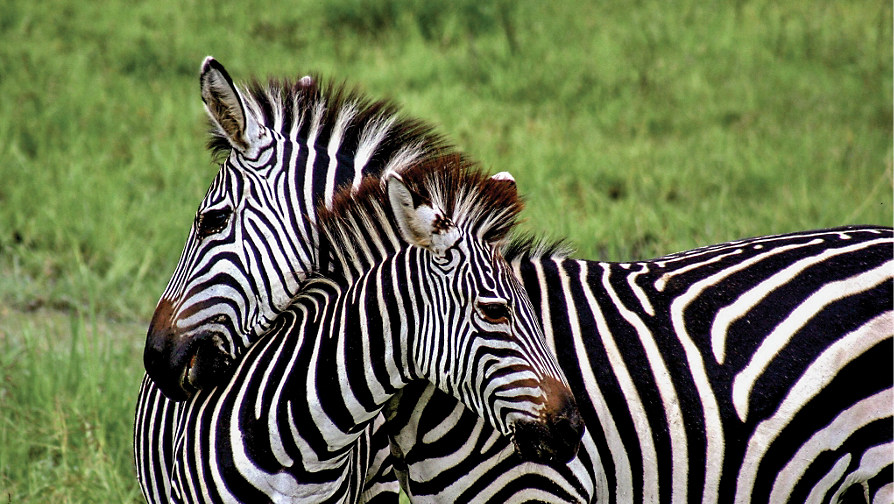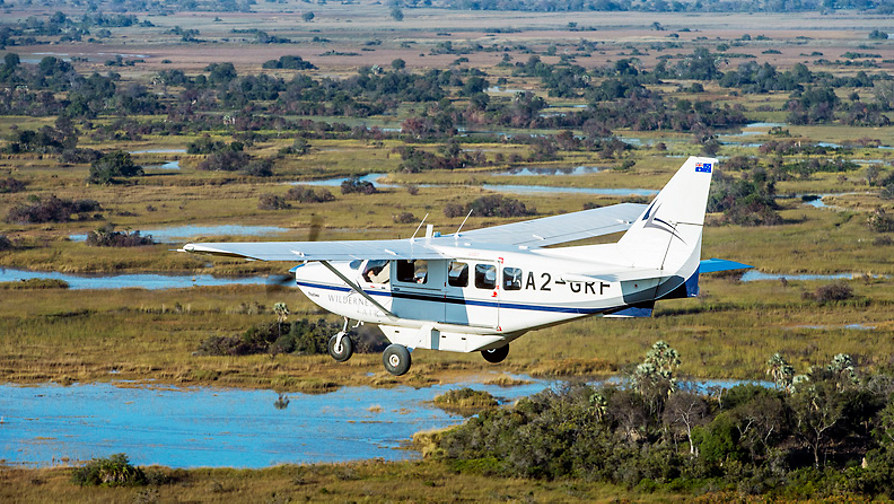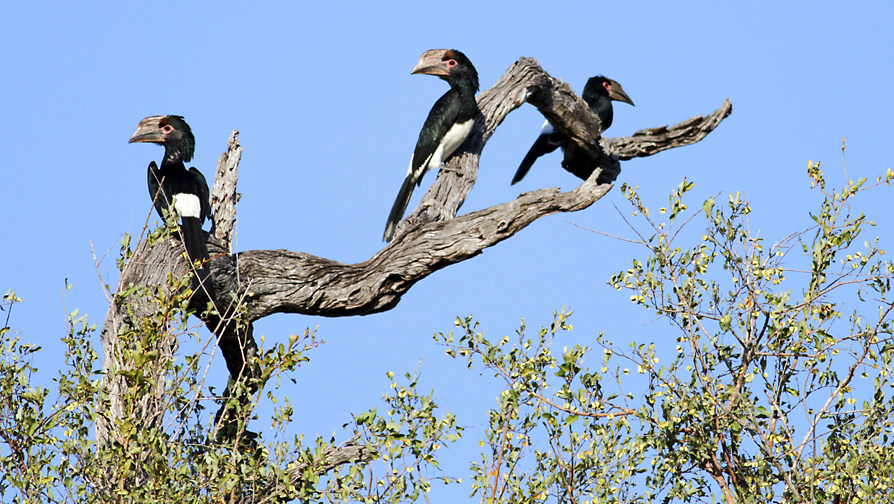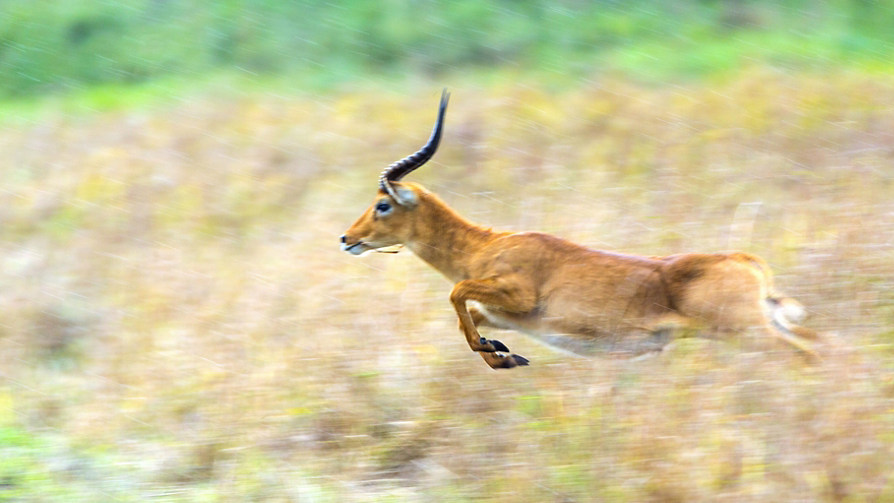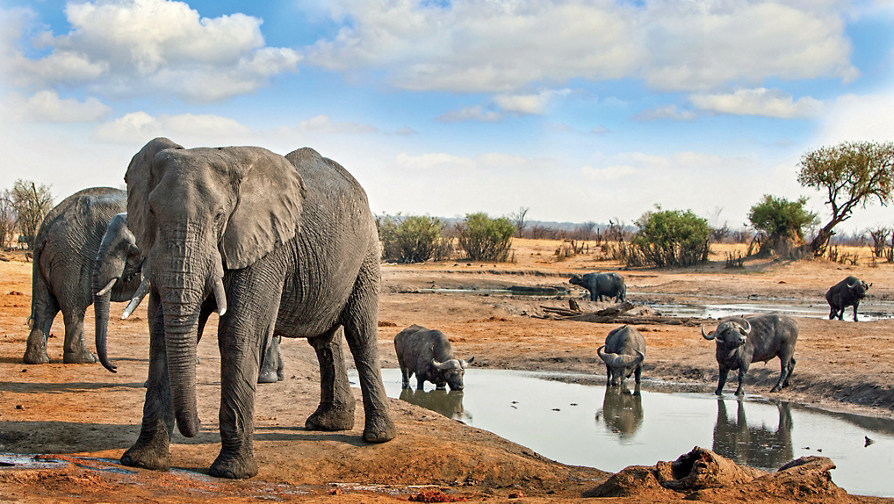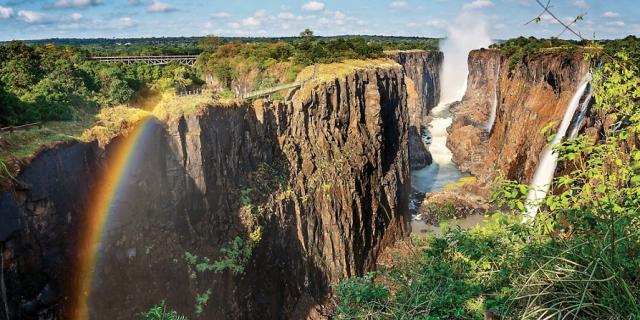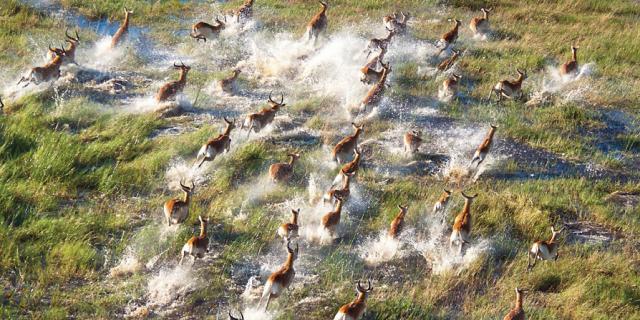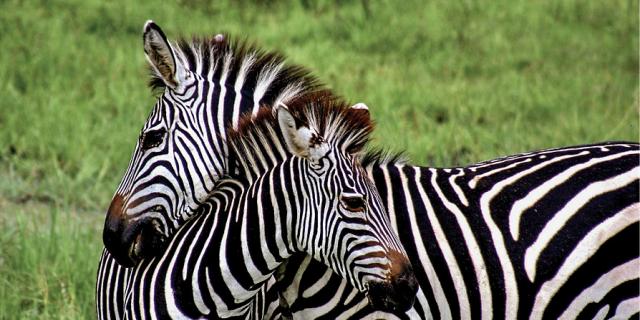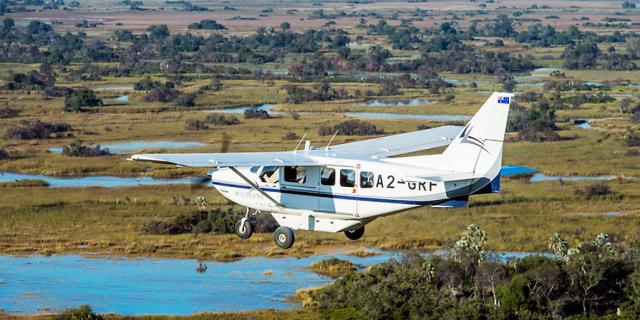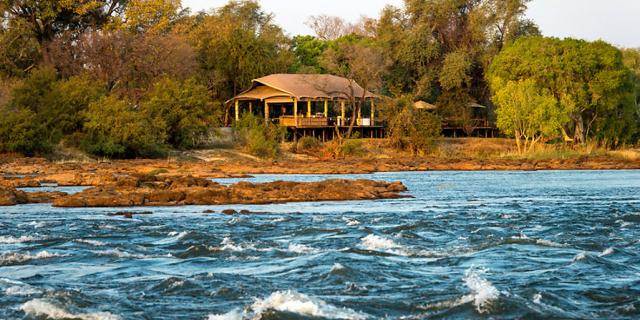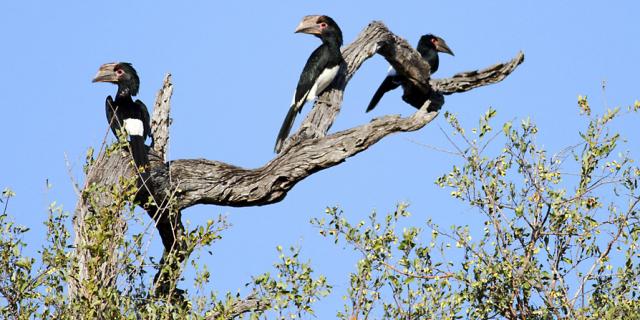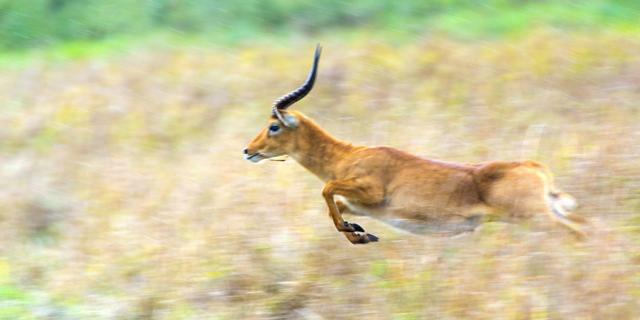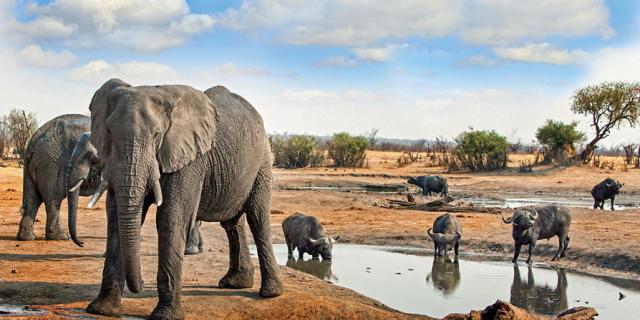- Explore in a small group of 8-16 travelers (average group size of 13)
- Accommodations for 15 nights
- 42 meals—15 breakfasts, 13 lunches, and 14 dinners
- Up to 27 small group activities, including up to 19 game-viewing drives, boat cruises, and walks, plus park fees
- Services of a local O.A.T. Trip Experience Leader and driver-guides
- Gratuities for local guides, drivers, lodge and camp staff, driver-guides, and luggage porters
- 5% Frequent Traveler Credit toward your next O.A.T. trip
- Unlimited filtered water at camps
- O.A.T. safari duffle and a complimentary wash of 3 items at the laundry service at tented camps
Please note:
Deposit requirement on land trips is $350
Past traveler savings of 5% if you traveled from 2018 onward
New travelers get $100 savings
Join us for a wealth of unforgettable experiences on an adventure 93% of our travelers rated excellent. Majestic elephants congregate around a waterhole in the depths of the wilderness ... members of a village near Hwange National Park welcome your small group ... the spray of Victoria Falls roars in the distance ... you and your travel companions exchange stories around a fire under a star-filled African sky. In the morning, you wake to the birdsong emanating from nearby trees—and begin another day on the safari of your dreams.
On this adventure, we’ll spend 12 nights in small lodges and tented camps. Enjoy up to 19 game-viewing drives with our sharp-eyed Trip Experience Leaders and expert, naturalist driver-guides; individual interactions in remote villages due to our small group size of just 8-16 travelers (with an average of 13); a rhino tracking excursion (January-February and November-December departures); and flights via bush plane over the legendary African landscape. From world-famous Chobe National Park to the majestic Okavango Delta, and big game to local cultures—this safari has it all. We'll also truly get to know the people of Southern Africa when we spend A Day in the Life of a small village, share a meal with a local family during a Home-Hosted Dinner, and learn about Controversial Topics from the people directly affected by them—from the disparate views of trophy hunting and poaching to the challenges faced by coal miners and their families in Hwange. And whenever you’d like, you have the freedom to explore more of Africa on your own: Break off from the group for independent discoveries—like enjoying dinner in Victoria Falls while listening to a live township jazz band at Mama Africa—during free time.
DAY 1
Depart U.S.
Destination: Johannesburg
You depart today on your overnight flight from the U.S. to Johannesburg, South Africa.
DAY 2
Arrive in Johannesburg, South Africa
Destination: Johannesburg
Accommodations: Southern Sun O.R. Tambo International Hotel or similar
Activity Note: Travelers who personalized their adventure by arriving early in Johannesburg will remain in their current hotel this evening. They will join the rest of the group in the morning of Day 3.
Late Afternoon/Evening: Depending on your flight schedule, you'll arrive in Johannesburg late this afternoon or this evening to rest before flying to Victoria Falls tomorrow morning and traveling to Hwange National Park. You will be met at the airport by an O.A.T. representative and take a 10- to 15-minute transfer by minibus to your hotel, located near the airport. Depending on the hotel you stay in, it may feature a pool, bar, restaurant, and health club for your enjoyment. Typical rooms include satellite TV, wireless high-speed Internet, a safe, coffee- and tea-making facilities, and private bath. Here, you'll be joined by those who traveled on our optional New! Namibia: Colonial Windhoek, Sossusvlei Dunes & the Skeleton Coast or Karongwe Private Game Reserve: Quest for Southern Africa's Big 5 extension. Due to our early flight the next morning, you can either visit the hotel’s restaurant for dinner on your own or retire to your room to prepare for our 7am wake-up call.
DAY 3
Fly to Victoria Falls • Transfer to Hwange National Park • Game-viewing drive
Destination: Hwange National Park
Meals included: B D
Accommodations: Kashawe Tented Camp , Makalolo Plains Camp or similar
Activity Note: With a morning flight to Victoria Falls, Zimbabwe, followed by a drive over both paved and unpaved, bumpy roads to Hwange National Park, this is a long travel day. We may also experience a possible delay when passing through customs. Total transfer time will be around 10 hours. You will need to climb a few steps to board the safari vehicle during today's game-viewing drive.
Breakfast: Served buffet-style at the hotel starting at 8am, with regional and American options available.
Morning: Around 9am, we’ll board a bus and drive for about 10 minutes to the nearby Johannesburg airport to check in for our 2-hour flight to Victoria Falls, Zimbabwe.
Lunch: A light lunch will be served on the flight to Victoria Falls.
Afternoon: Upon arrival in Victoria Falls around 1pm, we’ll meet with our Trip Experience Leader. After going through customs, we'll board a van around 3pm and then set off on a drive of about 2 hours to the gated entrance of Hwange National Park. Then, we’ll meet with our guides, split into smaller groups, and board two open-air safari vehicles around 5:45pm to head to our tented camp, which is located inside Zimbabwe’s largest park. Hwange is home to many diverse habitats, from teak forests to stands of palms to vast savannah plains. Likewise, you may behold a rich menagerie of game that can include elephant, buffalo, eland, wildebeest, impala, lion, leopard, cheetah, and more than 400 known bird species. The park is also known for its herds of sable antelope, a graceful animal with large, elegant horns.
Around 6:30pm, we’ll arrive at our camp located in the park. Upon arrival, we'll have a short 20-minute briefing, during which the camp manager will explain how camp staff will escort travelers to their rooms after dark each night. We will go into more detail about the camp during tomorrow's orientation briefing. No matter which campsite you stay at, the site will offer panoramic views of the surroundings with ideal access to game-viewing. Typical amenities include a large, tented main lounge and dining area, and tented rooms with en suite shower and toilet.
Dinner: Served buffet-style at our camp’s main dining area just before 7pm, featuring a choice of entrees (fish, meat, and vegetarian options), along with regionally-inspired side dishes that utilize fresh local ingredients.
Evening: On your own—you are free to return to your tent, or relax with fellow travelers by the fire pit or in the common area to talk about the day’s activities and your upcoming Africa discoveries.
DAY 4
Explore Hwange National Park • Morning Game-Viewing Drive • Controversial Topic: The Exploitation of the Coal Miners of Hwange with Sauseje Phiri, daughter of a miner • Afternoon Game-Viewing Drive
Destination: Hwange National Park
Meals included: B L D
Accommodations: Kashawe Tented Camp , Makalolo Plains Camp or similar
Exclusive O.A.T. Activity: Today will feature the Controversial Topic of the exploitation of the coal miners of Hwange. We’ll meet with local woman Sauseje Phiri who lost her father to respiratory complications caused by prolonged exposure to coal dust. She will share how his death and consequent failure of the mining company to compensate their workers affected her family. Read more below about this difficult but important conversation.
Activity Note: This will be a full day of game-viewing in Hwange National Park that begins very early in the morning (with a 5:30am wake-up call). We will return to the camp for brunch, and then head out again and get back to camp at about 6pm. When dressing for your safari adventure, keep in mind that neutral earth tones (browns, tans, greys, or greens) are usually best—blue or black clothing should be avoided in certain areas as they attract tsetse flies. And while temperatures vary greatly depending on the time of year, the air is usually cool on early morning game-viewing drives, so you may wish to dress in layers to stay warm.
Breakfast: Served buffet-style at the camp’s main dining area starting at 6am, featuring a continental breakfast of pastries and yogurt with coffee.
Morning: Around 6:30am, we’ll board open-air safari vehicles and set off on a 3-hour game-viewing drive with our Trip Experience Leader and professional driver guide in Hwange National Park, which offers game viewing year-round due to its man-made waterholes. During all of our drives, we will learn about the region's flora and the intricate cycle of life in the bush. Our expert guides may expound on everything from how elephant dung can be used as mosquito repellent, to how the giraffe is able to eat leaves off of the thorny acacia trees.
We'll return to the camp just after 9:30am. You'll have about 30 minutes of free time to relax and freshen up before we regroup at 10am for a Welcome Briefing with our Trip Experience Leader and camp staff. We'll learn about the camp facilities and get familiar with our surroundings. During this briefing, we will also introduce ourselves and review our itinerary in more detail (including any changes that may need to occur). Our Trip Experience Leader will also discuss logistics, safety and emergency procedures, and answer any questions we may have.
Brunch: Served around 11am at the camp's main dining area, featuring a variety of hot and cold brunch choices.
Afternoon: Enjoy free time to relax in our tented rooms or in the common area during the hottest part of the day. You may also choose to join a local guide on a walk around the lodge. They'll identify which animals have passed through the area, as well as the medicinal uses of plants grown here.
Then, we’ll gather around 2:30pm for afternoon tea and snacks. As we sit together, we’ll delve into the Controversial Topic of the exploitation of the local coal miners, and the life-long struggles they and their families continue to endure. We’ll be joined by a local woman whose life has been directly impacted by this issue—Sauseje Phiri, the daughter of a late coal miner.
Founded in 1899, Zimbabwe’s Hwange Colliery Company—which you may have glimpsed during our private motorcoach drives—mines one of the country’s richest coal deposits. Its coal reserves are estimated to last over 1,000 years at the current production levels. The largest shareholder of this mine is the government of Zimbabwe itself. Yet the colliery hasn’t paid wages in excess of $70 million to more than 3,200 workers since 2013. As a result, the miners do not have the financial means to access adequate food, medical care, and education for their families—let alone any other services that require money.
The exploitation of these hard-working miners has not gone unnoticed. While the miners themselves, predominantly men, fear reprisal or loss of employment if they try to fight for better wages, their wives, mothers, and sisters formed the Women Under Siege movement and have been sporadically protesting at the mine’s gates for years, demanding improved wages from both the colliery and the government. The government however, places the blame entirely on the Hwange Colliery, insisting that poor management led to the company’s many issues: Decades of looting, the alleged misuse of a $115 million government loan, the theft of coal stock by connected local syndicates, and the nepotistic appointments of unqualified relatives and friends to upper management positions.
While the directors of the mine have never publicly responded to Women Under Siege about why they haven’t been able to honor salary obligations, they have repeatedly blamed the low wages on their own financial woes, claiming it is selling coal at a loss and that it is besieged by local and foreign creditors to whom it owes up to $300 million. Yet in the last year alone, the colliery sold 1.5 million tons of coal to buyers in South Africa and Zambia. It is such a highly prized asset, that the company’s stocks were, until recently, listed on the Zimbabwe Stock Exchange, the Johannesburg Stock Exchange, and the London Stock Exchange.
The financial gains of the colliery do not trickle down to their hardest working employees, however. The miners live in or close to poverty despite the fact sales of coal have increased by 20% over the last 3 years. And while the company provides employment and housing for the local miners, their monthly wages are the equivalent of just $35 USD—the value of which is around two pockets-full of potatoes. In fact, until recently, workers did not receive a monetary salary at all, but were paid with a parcel of groceries. And since the coal mining industry remains the dominant economic factor in Hwange with around 3,200 miners in its employ, the lives of an average of 19,000 people—the families of these miners—depend on the colliery for survival.
As Sauseje will tell us, the price of working in a coal mine not only takes a financial toll, but a physical one as well. In 1972, Sauseje’s grandfather was killed in a catastrophic mining accident which also claimed the lives of 471 other miners. To date, the victim’s families have not received any financial compensation. Instead, the Hwange Colliery Company gave Sauseje’s father—who was 17 at the time—his late father’s position as a form of compensation. Far from improving his life, the job instead shortened it. Ongoing poor working conditions—primarily prolonged exposure to inhaling coal dust—has resulted in lung diseases such as bronchitis, asthma, and cancer in most miners, Sauseje’s father included. He passed away in 2003 due to respiratory complications, leaving behind a wife and ten children. This time, none of the surviving members of the family were granted employment by the colliery.
Sauseje’s life has continued to be a struggle since then. Now a single mother of three, she works as a shop keeper making the equivalent of $50 USD a month to support herself and her family. And yet she feels fortunate, as it is estimated that approximately 90% of Zimbabwe’s people are unemployed. And for those who do find work in Hwange’s coal mine, the struggles far outweigh the benefits of employment there.
We’ll discuss this difficult yet important topic for around 20 minutes—our Trip Experience Leader adding some context by sharing the views of the mine itself, and how they believe they have helped the community by providing jobs. Then we’ll have around 40 minutes to ask Sauseje any questions we may have.
After our conversation, we’ll thank Sauseje before boarding our open-air safari vehicles again to set off on another game-viewing drive just after 3:30pm. Later, we’ll rely on the tracking skills of our guides to choose the perfect spot to observe the animals during the fading afternoon light as we enjoy our first African “sundowner” (drinks and snacks during sunset over the Africa Bush) before returning to camp around 6pm.
Dinner: At about 6:30pm, we’ll have dinner together at the main dining area with a selection of regionally-inspired items prepared by our expert chef.
Evening: All evenings at our tented camps are free for you to relax in your room, linger in the common area for a nightcap, or sit by the fire with your fellow travelers.
DAY 5
Grand Circle Foundation visit: St. Mary’s Primary School • A Day in the Life of a Hwange village • Afternoon game viewing in Hwange National Park
Destination: Hwange National Park
Meals included: B L D
Accommodations: Kashawe Tented Camp , Makalolo Plains Camp or similar
Exclusive O.A.T. Activities: Today we’ll visit St. Mary’s primary school—Grand Circle Foundation site—and interact with the students and teachers there. Then we’ll experience A Day in the Life of a Hwange village where we’ll meet the chief, shop at a local market, then head to a local family’s home where we’ll learn how to prepare a traditional meal using very unique ingredients. Read on to learn more about these immersive activities.
Activity Note: We will have an early wake-up call at about 5:30am before riding in open-air vehicles to the park gate. Then, we’ll switch to a minibus on our way to a village outside of Hwange National Park and will travel over bumpy, dusty roads.
Breakfast: Served buffet-style at the camp’s main dining area at 6am, featuring a continental breakfast of pastries and yogurt with coffee.
Morning: We’ll leave camp at about 6:30am, board our safari vehicles, and drive to a small Hwange village. Around 7am we’ll arrive in Mbala where we’ll switch from our safari vehicles to a private motorcoach before continuing our journey. Then around 8am we’ll arrive at St. Mary's primary school (when in session), which is supported in part by Grand Circle Foundation as part of the World Classroom initiative.
Enjoy this opportunity to learn more about what education is like in a remote village in Zimbabwe. After we are greeted by the school's principal—Mrs. Thokozile Dube—we may have a chance to meet the teachers and some of their students. Perhaps we’ll help them out with their lessons or practice their English with them during our time here. St. Mary’s is typical of the many village schools in the region and lacks many basic necessities. The Foundation has contributed to the building of some new classrooms and donated several computers, which you may see in the school’s small computer lab. Items that you may wish to bring with you to donate might include educational books, maps, solar-powered calculators, toiletries, secondhand clothing, deflated soccer balls, or any number of items.
Learn more about the sites we support »
Around 9:30am, we'll bid the students goodbye before heading to a small community called Lukhosi to experience A Day in the Life of a Hwange village. Once we arrive around 9:40am, we’ll pause at the village market where we’ll have about 20 minutes to shop for local ingredients to bring with us for a meal we’ll take part in making later today. Some of the items on our grocery list will be maize (corn) meal, tea, local vegetables, and Mopani worms to take as a gift for the family we’ll visit later this morning.
Then around 10am, village leader Chief Charles Nekatambe will meet us outside the store. Chief Nekatambe is the reigning chief of the Nambya people in this village and the surrounding areas. He inherited his title from his uncle in 2011 as his own father passed away before becoming chief himself. His grandfather, Chief Mashambwa, had eight wives—since then the chieftainship has revolved around the eight houses of these wives, yet the title can only be held by a male member of the family. The process of appointing a successor can therefore be a complicated task, as it is not always an automatic father-to-son transition, but instead revolves around the families of these eight houses. For example, since Chief Nekatambe only has daughters, his bother is currently next in line. Before becoming chief, Charles worked at the local colliery. Now, he plays a critical role in his community, making important decisions on development, infrastructure, village projects, conflict resolution, youth development programs, and more. He also owns and sponsors a competitive local soccer team called the Nekatambe Cheetahs.
Chief Nekatambe will take us on a short walking tour of the village, revealing how local people live, tend to their animals, and raise their crops. Lukhosi is actually able to cultivate their crops year-round, due to the implementation of a community irrigation system. We’ll also learn a few words in the language of the local Nambya people, before sitting down with some village members to gain insight into their culture firsthand.
Then, we'll head to a nearby family’s house to have an opportunity for hands-on discovery as we spend about an hour taking part in some farming activities (season permitting)—like planting, milking a cow or goat, and collecting eggs. The animals kept by the families of the village are used primarily for their milk and eggs, but on special occasions—such as a birthday or wedding—they will be used for meat. For everyday protein, the people here look to what we might consider a very unique source: Mopani worms.
Included in the groceries we collected earlier this morning is a sampling of these Mopani worms. After completing our chores, we’ll gather with the family around an outdoor fire and learn how to prepare then fry the worms. A healthy and affordable source of nutrition, Mopani worms contain three times the amount of protein as beef. We’ll have about 30 minutes to try a taste of the fried Mopani worms while asking our hosts any other questions we may have about village life.
We conclude our discoveries around 12:30pm, thanking both Chief Nekatambe and our host family for their hospitality. Then we’ll drive about 1.5 hours back to our camp, arriving just in time to freshen up and enjoy lunch.
Lunch: At the camp around 2pm, featuring traditional dishes. The camp staff will prepare our meals using local cooking techniques, as well as fresh, regional ingredients.
Afternoon: After about 1 hour of free time, we’ll set off on another late afternoon game-viewing drive through Hwange National Park aboard open-air safari vehicles at about 4pm. Perhaps, we'll seek out a pack of wild dogs or any number of the many different animals found here that we haven’t spotted yet. We’ll return to camp at approximately 5:30pm and enjoy some time to relax before we regroup for dinner.
Dinner: Served buffet-style at the camp’s main dining area around 6:30pm, featuring traditional African dishes.
Evening: You’re free to relax at the campsite, perhaps to sit with a cool drink and observe the brilliant stars of the African night sky for our last night in Hwange.
DAY 6
Overland to Livingstone • Fly to Kafue, Zambia • Game-viewing drive
Destination: Kafue National Park
Meals included: B L D
Accommodations: Musanza Tented Camp , Lufupa Tented Camp or similar
Activity Note: We will have an early wake-up call at about 5:30am. Then this morning, we will drive from Hwange, Zimbabwe, to Livingstone, Zambia, where we'll fly aboard a small plane (4-12 seaters, and we may have to split up) for approximately 1-1.5 hours to Kafue National Park. Total transfer time will be up to 11 hours. Travelers who reserve a January-February or November-December departure of this adventure will spend Days 6-8 in Mosi-oa-Tunya National Park, with minor differences in included activities and transfer times.
Breakfast: Served buffet-style at 6am in the camp’s lounge area.
Morning: After breakfast, we’ll check out of our rooms and depart camp at about 7am to make our way to our next destination: Kafue National Park in Zambia. Our overland transfer will take us back to Victoria Falls, arriving around 11:45am.
Lunch: A packed lunch will be provided during our overland transfer.
Afternoon: Just before noon, we'll cross the Zambian border to the town of Livingstone, about seven miles from the falls. Just before 1pm, we'll stop at a local market to stretch our legs and discover the goods sold here. You may choose to grab a snack for the road before we get into taxis around 1:30pm for the next leg of our journey. We'll drive about 15 minutes to the airport, where we’ll split up into smaller groups and board small, privately-chartered planes around 2:15pm for our short flight (about 1-1.5 hours) to our camp at Kafue National Park. Upon arrival around 4pm, we'll drive around 15 minutes to our camp.
We’ll enjoy a Welcome Briefing at the riverside tented camps that we stay at in Kafue shortly after arriving. Typical safari-style tents have en suite toilets and showers and perhaps a deck, while the camp may include a fire pit, tented dining area, lounge, and bar. Then around 5pm, we’ll enjoy our first game-viewing excursion, which will either be by boat or safari vehicle.
One of Zambia's most impressive parks, Kafue was one of the first to join an initiative to link the national parks of five African countries into what will eventually become a 108,000-square-mile park, to be known as the Kvango-Zambezi Transfrontier Conservation Area (also the Okavango-Upper Zambezi TFCA). Our private O.A.T. campsites are situated in the northern section of the park along the banks of the Kafue River, one of the three rivers nourishing the park. From the decks of our safari-style tented rooms, we can view the slow-moving river—where we might enjoy the chance to fish for bream and pike during our stay.
In addition to 55 mammal species, Kafue is home to 500 species of birds—as many in this park as in all of Europe. Our guides will help us keep our eyes peeled for Black-cheeked Lovebirds, Bohm’s Bee-eaters, Pel’s Fishing Owls, a variety of cranes, and Zambia’s only endemic species, the Chaplin’s Barbet. We'll also be on the lookout for puku, an antelope found only in Zambia and the Congo.
We return to our camp around 6pm and you have about 30 minutes to freshen up before dinner.
Dinner: Served at the camp’s main lounge around 6:30pm, featuring dishes prepared by the camp staff.
Evening: You’re free to go back to your walk-in tent or relax with your fellow travelers by a cozy campfire set up along the slow-moving Kafue River.
DAY 7
Explore Kafue National Park • Controversial Topic: Trophy hunting in sub-Saharan Africa with game ranger Golden Kalindawalo & safari guide Brian Shiompa
Destination: Kafue National Park
Meals included: B L D
Accommodations: Lufupa Tented Camp , Musanza Tented Camp or similar
Exclusive O.A.T. Activity: Today we'll gather to discuss the Controversial Topic of trophy hunting in sub-Saharan Africa. During our conversation with game ranger Golden Kalindawalo and safari guide Brian Shiompa, we'll discuss the long-term effects of the recreational sport, as well as the arguments for and against it. This is a unique opportunity to examine the importance of effective wildlife management and the conflicting beliefs surrounding it. Read more about this conversation below.
Activity Note: Travelers who reserve a January-February or November-December departure of this adventure will spend Days 6-8 in Mosi-oa-Tunya National Park, with minor differences in included activities and transfer times.
Breakfast: To get an early start, a light breakfast of cold dishes, such as pastries, yogurt, fruit, and coffee will be served at 7am at our camp.
Morning: Since the temperate hours of early morning and late afternoon are when the wildlife is at its most active, we’ll set off at about 7:30am for a game-viewing excursion either by land or water. Keep your eyes peeled for the yellow-billed oxpecker, trumpeter hornbill, and grey crowned crane. Along the rivers that feed the park, we might also encounter the white-backed night heron, African finfoot, or saddle-billed stork.
We'll return to our camp just after 10am and you'll have some free time to take a nap, catch up on a book you brought with you, or relax.
Brunch: We’ll enjoy a hearty brunch featuring African-inspired specialties at our campsite at about 11:30am.
Afternoon: Take advantage of free time at the camp until about 2pm. Perhaps you’ll enjoy Kafue River views, or grab a cocktail with a fellow traveler.
Around 2pm, our group will reconvene in the lounge for a conversation surrounding the Controversial Topic of trophy hunting in Zambia. Our discussion will examine the impacts of game hunting for sport, as well as outline common arguments for and against it. To facilitate this conversation, we’ll be joined at the lodge by 47-year-old game ranger Golden Kalindawalo and 44-year-old safari guide Brian Shiompa, who have about 40 years of naturalist experience combined and both find the most joy in showing visitors wildlife—but not in taking trophies.
Trophy hunting is a form of recreational hunting in which the goal is to acquire parts of an animal to put on display. It was first introduced by British colonialists during the early 19th century—a time when wildlife flourished—and by the end of the century, the devastating effects of uncontrolled sport hunting were glaring. Though some protections were established since that time, only a fraction of these animals remain, and those that do are under constant threat. In Zambia, for example, the African dog population has declined from half a million to an estimated 6,000 in the last century. Just over the border in Tanzania, hundreds of thousands of black rhinos once roamed freely, while now it is estimated that only 5,000 are left. And, all across Africa, the lion population has declined by 42% over the last two decades alone. These are just a few of the numerous species whose futures are in question.
Over the years, political corruption, habitat loss, population growth and other significant factors—including hunting—have contributed to these dramatically dwindling populations. Still, hundreds of thousands of hunting permits are issued every year. Proponents of trophy hunting, which our Trip Experience Leader can speak to, maintain that they have a vested interest in ensuring these populations thrive because the sport depends on it. They also tout the fact the industry generates roughly $200 million in revenue in sub-Saharan Africa, a sum that is theoretically shared between government authorities, hunting companies, parks and surrounding rural communities. Furthermore, a fair number of local farmers who live within range of wild herds, such as elephants and lions, actively support trophy hunting. In recent decades, habitat loss has led to increased human-animal conflict, leading to an uptick in deadly encounters. Farmers fear that without hunting these scenarios would exponentially rise.
While the issue at hand isn’t simplistic, the cries to ban trophy hunting are growing, as is evidence against the controversial practice. Opponents not only believe this “kill for sport” mentality to be immoral, but numerous studies indicate that the revenue generated rarely reaches rural communities or goes toward conservation efforts. For example, National Geographic published a report in 2015 that found that elephant hunting fees in Zimbabwe went almost entirely to the government, a governing body famously rife with corruption. There is also a strong link between trophy hunting, poaching, and illegal hunting methods. Poachers often claim they are operating a trophy hunt as cover for their unlawful actions, and some hunting companies will go to criminal lengths to “produce” an animal for their clients—whether luring them outside of protected areas or inhumanely killing them. Wildlife management experts also contend that trophy hunting hurts the overall population of a species because it typically targets ornamental males, whose genetics are often critical for reproduction. If a dominant male lion dies, it often destabilizes the entire pack, leading to threats from outside males and the death of existing cubs.
Today's conversation will address a complex and emotionally charged subject here in Zambia, one which some travelers may find difficult. Approach the conversation as a unique and respectful discourse. After gleaning insights on this issue from our speakers for about 20 minutes, the conversation will open up to a 40-minute Q&A session, giving us the opportunity to probe deeper into this controversial issue.
Then around 3pm, we’ll gather at the main lodge for tea and snacks. During this time, we’ll also witness a peanut spread demonstration, in which legume crops are ground between two stones. We’ll even have an opportunity to try our hand at this traditional method.
Around 3:30pm, we’ll enjoy another game-viewing excursion or boating activity highlighting the myriad wildlife of Kafue. We return to our camp around 6pm and you have about 30 minutes to freshen up.
Dinner: At about 6:30pm, featuring a choice of buffet options prepared by the camp staff.
Evening: Your evening is free to linger by the campfire and enjoy a nightcap or return to your tent.
DAY 8
Explore Kafue National Park
Destination: Kafue National Park
Meals included: B L D
Accommodations: Musanza Tented Camp , Lufupa Tented Camp or similar
Activity Note: Travelers who reserve a January-February or November-December departure of this adventure will spend Days 6-8 in Mosi-oa-Tunya National Park, with minor differences in included activities and transfer times.
Breakfast: A light breakfast with a choice of pastries, yogurt, fruit, and coffee will be served this morning at 7am at our camp.
Morning: At around 7:30am, we’ll set off on a game-viewing excursion to explore the outer reaches of the park by boat or safari vehicle. It’s impossible to exhaust the discoveries at Kafue, one of the continent’s largest national parks—at 8,600 square miles, it is roughly the size of the entire state of New Jersey. Kafue’s habitats span riverine forests, floodplains, woodlands, and dambos (open grasslands). We return to our camp just after 10am and you have about 1.5 hours of free time. Perhaps you'll lay down and rest in your tent, or you may choose to take a stroll along the river.
Brunch: Served with a variety of traditional dishes at our campsite at about 11:30am.
Afternoon: Following our meal, you can relax at camp, enjoying the views of the Kafue River. Around 2:45pm, we’ll regroup for afternoon tea and snacks before setting off on another game-viewing excursion or boating activity focusing on Kafue wildlife around 3:15pm. There will also be opportunities to fish along the banks, as well as a sundowner cruise before returning to camp at approximately 6pm. Upon arrival, the camp staff will treat us to regional songs and dances. You may even get to learn some traditional moves yourself.
Dinner: Around 6:30pm, prepared by the camp staff. We'll enjoy the traditional flavors of Africa as our meal will be cooked with typical, local ingredients.
Evening: After dinner, you may wish to swap memories of all we’ve encountered on our explorations in this beautiful locale.
DAY 9
Fly to Livingstone • Transfer to Chobe National Park • Game-viewing drive
Destination: Chobe National Park
Meals included: B L D
Accommodations: Baobab Safari Lodge or similar
Activity Note: This morning, we’ll split up into even smaller groups and fly by small, chartered aircraft to Livingstone, Zambia, where we’ll journey by bus to the Zambian border and take a short boat ride to cross into Botswana. Then, we’ll continue overland to Chobe National Park in northern Botswana. Our total transfer time is up to 7 hours.
Breakfast: Served buffet-style at the camp’s main dining area starting at 7am, featuring a selection of hot and cold dishes.
Morning: Around 8am, we’ll leave our camp and enjoy a final game-viewing drive in Kafue of about 1 hour. Then we'll drive to an airstrip, arriving just before 9:30am, for our 1- to 1.5-hour flight to Livingstone. We arrive at the Livingstone airport around 11am before boarding our bus for a 1.5-hour drive to the border.
Lunch: We’ll have a light boxed lunch of fruits, nuts, and a sandwich on our way to Chobe National Park.
Afternoon: Upon arrival at the border around 12:30am, we’ll board a ferry for a 10-minute ride into Botswana. Then around 1:30pm, we board our next bus for a 1-hour drive to our lodge. We’ll check in and gather for a short orientation briefing with the Trip Experience Leader. We spend the next three nights at an intimate safari lodge. No matter which lodge you stay in, its location just outside the park gives us more time to spend on game-viewing drives while the dining room and bar may be perfect spots to view the sun setting over the river in the evening. Typical lodges feature comfortable bungalows, each with two beds and a private bath.
Chobe has one of the greatest concentrations of game found on the African continent and is sure to be a highlight of our safari adventure. Around 4pm, we’ll board open-air safari vehicles to get our first glimpse of Chobe’s wildlife during a late afternoon game-viewing drive with our expert driver-guides and Trip Experience Leader. We'll return to our camp shortly after 6pm.
Dinner: A buffet-style dinner featuring a selection of salads, entrees, and side dishes prepared by the camp staff will be served at about 6:30pm in the dining area.
Evening: After dinner, we can relax at the bar or enjoy views of the Chobe River from the main lounge of our open-air lodge.
DAY 10
Explore Chobe National Park
Destination: Chobe National Park
Meals included: B L D
Accommodations: Baobab Safari Lodge or similar
Activity Note: Today, we will have an early wake-up call at about 5:30am.
Breakfast: Served at the lodge's main dining area starting at 6am, featuring cold dishes, such as pastries, yogurt, fruit, and coffee.
Morning: Around 6:30am, we set off on an early morning game-viewing drive in open-air safari vehicles. The next two days are devoted to seeking out game in Chobe National Park, the second-largest (and first-established) national park in the country. Chobe National Park is home to one of the world's largest elephant populations—the present herd is estimated at 60,000. This enormous region offers variety in both wildlife and terrain. Riverine forest, flood plains, and mopane are home to large and small game. Elephants gather around baobab trees, drawn by the water stored in their bark.
Large groups of giraffe amble about the land, and hyena, cheetah, leopard, and wildebeest may also be glimpsed in this thickly populated habitat. The birdlife here is diverse, ranging from eagles and bustards to plovers and rollers, and bee-eaters bustle near their sandbank nests. There are also water birds, such as egret, ibis, and heron, along the river. We’ll return to our lodge at about 10:30am.
Brunch: A selection of hearty brunch items will be available in the lodge beginning around 10:30am.
Afternoon: Following some free time after brunch, we'll regroup around 2:30pm for tea and a conversation about Botswana's history with a local guide. Then, several women from a local village will visit us at our camp to give a basket-weaving demonstration around 3pm. In our small group, we'll get one-on-one time with some of the women who will show us how they use palm fronds to make their finely detailed woven baskets and how they introduce various colors from the bark of trees and other natural sources. During this hands-on demonstration, we'll also have the opportunity to try weaving a design ourselves. Afterwards, we set off on a game-viewing drive in open-air safari vehicles around 3:30pm, enjoying sundowners before we return to camp just before sunset around 6pm. Then, we'll gather to soak in the views of the sun sinking behind a nearby waterhole.
Dinner: Served buffet-style at the lodge at around 6:30pm in the dining area, featuring traditional dishes.
Evening: You are free to enjoy the facilities of our lodge, relax with a book, or take in the serenity of our surroundings along the Chobe River.
DAY 11
Explore Chobe National Park • Controversial Topic: Death and poaching with veteran game ranger Moses or Ban
Destination: Chobe National Park
Meals included: B L D
Accommodations: Baobab Safari Lodge or similar
Exclusive O.A.T. Activity: Today’s discoveries include a candid conversation about a Controversial Topic: The morality of Botswana’s “shoot to kill” anti-poaching policy, which was rescinded in 2018, but some believe should be reinstated as an upsurge in illegal hunting threatens to render the world’s rhinoceros population extinct. We’ll discuss the issue with a veteran game ranger, who has lived his entire life in Botswana and is intimately connected to the crisis caused by poaching, as well as the economic and social issues that drive locals toward it. Read more about this activity below.
Activity Note: This will be a full day of game-viewing in Chobe National Park that begins very early in the morning (with a 5:30am wake-up call).
Breakfast: Served buffet-style at the camp’s main dining area starting at 6am, featuring a selection of hot and cold dishes.
Morning: We’ll begin a full day of game-viewing activities at about 7am. With the help of our expert driver-guides, we hope to spot some of Chobe's elephants, in addition to zebra, Cape buffalo, hippo, and crocodile.
Lunch: Around 1pm, we’ll take a break from our full-day game-viewing drive to enjoy a picnic lunch of fruits, vegetables, pasta, cheeses, homemade bread, and more.
Afternoon: We continue our game-viewing in Chobe throughout the afternoon, relying on the expert tracking skills of our guides and Trip Experience Leader. Around 2:30pm, our game-viewing excursion concludes and we return to camp, where you'll have some free time to relax.
At around 4pm, we’ll gather in the lounge with a veteran Botswana game ranger for an hour-long conversation about a Controversial Topic: Botswana’s controversial “shoot to kill” anti-poaching policy.
The world’s rhinoceros population is gravely threatened—a rhino is killed by poachers every ten hours, a trend which will render the majestic creature extinct by 2025 if left unchecked. In 2013, Botswana took the drastic step of arming its game rangers and authorizing them to use lethal force against any poachers they encountered in the wild; while undeniably extreme, the policy was effective, as Botswana experienced significantly less poaching than its neighbors, making it a relative “safe space” for the endangered species. In 2018, the policy was rescinded, and an upsurge in poaching subsequently ensued—56 rhinos were killed in Botswana over the following two years, roughly 10% of the country’s rhino population—leading to a serious debate about whether it’s time to arm Botswana’s rangers and declare open season on poachers once again.
We’ll discuss this difficult subject with one of two game rangers—Moshe “Moses” Zhibi, or Bannyatsang “Ban” Shakwa—each lifelong Botswana residents with decades of experience in the hospitality and conservation industry. As certified wildlife experts, Moses and Ban each have a deep respect for Africa’s rare and unique animals, and have dedicated their lives to showing off their majesty and keeping them safe from harm. However, they also have a deeply-rooted love and connection with Botswana’s people—Moses and Ban have each lived their entire lives in this country and have started families here, and are familiar with the challenges faced by citizens trying to survive in Botswana’s impoverished communities. Because of their connections and experience, they’ll be able to offer uniquely personal insights into why so many people become poachers, how it affects daily life in Botswana, and how challenging it is to solve the issue.
For many people in Botswana’s rural and impoverished communities, where meaningful employment is limited and many struggle to survive on even a subsistence level, poaching can be seen as either a gruesome necessity for survival, or a tempting road to riches. The crisis has been exacerbated by the COVID-19 pandemic; as the virus cripples the local economy, sending even more people into poverty, unscrupulous “traditional medicine” vendors in China, Vietnam, and other countries have touted rhino horn as a cure for the deadly virus, in addition to its other dubious health benefits. As a result, the demand for poachers and their ill-gotten goods has risen significantly in recent years, threatening the world’s rhino population even further.
On the other hand, as sympathetic as a poacher’s plight may be, the simple fact remains—if something isn’t done soon, poachers will wipe the rhinoceros off the face of the Earth within the next five years. While most agree that current anti-poaching measures aren’t working, there is a deep moral debate within Botswana about how much farther the authorities should be allowed to go. At what point does it become acceptable to sacrifice a human life to save an animal’s? How does the moral calculus change when an entire species’ survival is at stake? Are there any alternative solutions that can save Botswana’s rhino population without resorting to bloodshed?
Moses or Ban will spend about 20 minutes sharing their stories and points of view about this challenging issue, and we’ll then have the rest of the hour to ask candid questions of our own to deepen our understanding. Our private lounge offers a panoramic view of the African bush, where we might see rhinos or other safari wildlife roaming about as we talk; we’ll end our conversation with a quiet moment of contemplation to observe these creatures in their natural environment as we discuss their uncertain future.
Our conversation will end at around 5pm, when we'll regroup for drinks as we watch the sun set before enjoying a performance by the lodge staff. At about 6pm, they will treat us to some traditional dances and songs.
Dinner: Beginning at 6:30pm at the lodge, featuring a traditional South African braai, similar to our barbecue but more closely connected to the outdoor life, culture, and laid-back lifestyle of southern Africans. We'll enjoy traditional dishes like boerewors, African sausage, during this meal.
Evening: After dinner, we can reflect on the memorable animal sightings we’ve made while celebrating our last night in Chobe.
DAY 12
Fly to the Okavango Delta • Game-viewing drives
Destination: Okavango Delta Region
Meals included: B L D
Accommodations: Santawani Camp or similar
Activity Note: This morning, we take a minibus ride of about an hour to Kasane, Botswana, and then a flight of a little more than an hour by small bush plane to the Okavango Delta region. Our total transfer time is up to 6 hours.
Breakfast: Served buffet-style at the lodge at 7:30am, featuring a selection of hot and cold dishes.
Morning: Around 8:30am, we check out of our rooms and board a minibus to Kasane's airport, arriving around 9:30am. At about 10:30am, we’ll split into smaller groups for our 1-hour flight to the northern area of the Okavango Delta region. Upon landing, we'll enjoy a game-viewing drive in an open-air safari vehicle en route to our camp. We arrive at our camp around 12:30pm and check in. The camp features tented cabins, each including an en suite bathroom with running water, toilets, and showers.
Lunch: Around 1pm at our camp, featuring a variety of hot and cold selections. The camp staff will prepare typical dishes using traditional techniques, so our meal will reflect the flavors of the region.
Afternoon: You are free to relax, or you may choose to enjoy tea around 2pm. Then, we gather together for a late-afternoon game-viewing drive beginning at about 4pm. One of the world’s largest inland deltas, the Okavango is a watery wonderland of islands, marshlands, and waterways teeming with wildlife. Designated a UNESCO World Heritage Site, the Okavango Delta is also home to some of the world’s most endangered species of large mammals, including cheetahs, white and black rhinos, and African wild dogs. We return to our camp just after 6pm and you have some time to freshen up.
Dinner: Served in the camp's main dining area at about 6:30pm, with many hot and cold selections.
Evening: You can relax in our camp, which features a dining area, large lounge, fire pit, and an area overlooking a watering hole where we can observe the local wildlife.
DAY 13
Explore Okavango Delta
Destination: Okavango Delta
Meals included: B L D
Accommodations: Santawani Camp or similar
Activity Note: This morning, we will have an early wake-up call at about 5:30am. Our mokoro excursions are dependent on safety and water levels, which fluctuate constantly in the Delta, regardless of the season. When you arrive in the Delta, your Trip Experience Leader will monitor conditions and advise you of whether it's possible to explore by canoe. You will either explore by mokoro or set off on a game-viewing drive on Day 13 and Day 14.
Breakfast: Served at the camp’s dining area starting at 6am, featuring cold dishes, such as pastries, yogurt, fruit, and coffee.
Morning: At about 6:30am, we'll split into smaller groups and explore the Okavango Delta by mokoro (if conditions permit), or we'll set off on a game-viewing drive aboard open-air safari vehicles. Mekoro (the plural of mokoro) are traditional canoe-like vessels commonly used in the Okavango Delta as a mode of transport. If we explore using these canoes today, we'll divide into pairs and travel along the calm waters of the delta alongside a local guide. We'll discover the distinct flora and fauna of the delta as our local guide propels our mokoro forward by using a long pole. We return to our camp around 11am.
Brunch: Just after 11am at our camp, featuring a variety of hot and cold selections.
Afternoon: You have some free time to enjoy our surroundings, or you may challenge our Trip Experience Leader or the camp staff to a traditional African game. They can teach you the rules before playing. Then, just after 4pm, we'll regroup and set off on a game-viewing drive and sundowner in the Delta’s neighboring savannah. We conclude our drive around 6pm and return to the camp where you have some time to relax before dinner.
Dinner: In the camp’s main dining area around 6:30pm, featuring a selection of traditional dishes.
Evening: On your own—you may wish to relax by the warmth of the fire pit or enjoy a nightcap at the bar before retiring for the night.
DAY 14
Explore Okavango Delta • Game-viewing drives
Destination: Okavango Delta Region
Meals included: B L D
Accommodations: Santawani Camp or similar
Activity Note: This morning, we will have an early wake-up call at about 5:30am.
Breakfast: A light breakfast of cold dishes, such as pastries, yogurt, fruit, and coffee begins at 6am, as we get another early start for our game-viewing drive.
Morning: At 6:30am, we continue to search for wildlife in the Okavango Delta region. We'll again split into groups and explore the area by mokoro on the Delta (if conditions permit), or we'll set off on a game-viewing drive aboard open-air safari vehicles. We return to our camp around 11am, just in time for brunch.
Brunch: Just after 11am at our camp, featuring a variety of hot and cold selections.
Afternoon: We can relax during the hottest part of the day (this is the time when the wildlife relaxes, too) before regrouping for high tea at 3:30pm and then setting off around 4pm on a 2-hour game-viewing drive in the Delta’s neighboring savannah aboard open-air safari vehicles.
Dinner: Served around 6:30pm back at camp, featuring a selection of hot dishes and regional cuisine.
Evening: You are free to take some time after dinner on your final night in the Okavango Delta to observe the stars and reflect on the daily drama of the wildlife encounters you may have observed here.
DAY 15
Fly to Victoria Falls, Zimbabwe • Controversial Topic: The Plight of Sex Workers and the Spread of HIV and AIDS with sex worker Matilda Ramotswe • Home-Hosted Dinner
Destination: Victoria Falls
Meals included: B L D
Accommodations: Shearwater's Explorers Village or similar
Exclusive O.A.T. Activities: Today we will discuss the Controversial Topic of sex workers in Botswana, and the omnipresent risk of HIV and AIDS. Speaking with a sex worker named Matilda Ramotswe, we will learn the harsh and uncomfortable truths of this topic. Later, we’ll visit a local family in their home for a Home-Hosted Dinner—sharing a meal and learning about their daily lives. Read more about these two activities below.
Activity Note: We take a short flight to Kasane, a small settlement about 20 minutes from the border crossing between Botswana and Zimbabwe. From there, we’ll continue by bus to Victoria Falls. Our total transfer time is up to 4 hours. During our tours of the Falls, it's a good idea to wrap your camera equipment, cash, and other valuables in plastic.
Breakfast: Served buffet-style at 6:30am in the dining area of our camp, featuring a selection of hot and cold dishes.
Morning: We board our camp vehicles and depart camp around 7:30am, heading to a nearby airport, and arriving around 8am. We'll split up into smaller groups for our 1-hour flight to Kasane. Upon arrival around 9:40am, we’ll collect our luggage before boarding our private motorcoach to cross the border into Zimbabwe.
Around 10am, our motocoach will pull into a local truck stop near the border which is frequented by truck drivers carrying goods across the country. It is here we will take part in a very sensitive Controversial Topic: The lives and struggles of local sex workers here, including the threat of HIV and AIDS.
Botswana has the third highest HIV rate in the world, and while prostitution is illegal here, many women—particularly from poor, rural communities—choose this line of work out of financial desperation. These young women often move to the bigger cities to escape male-perpetuated violence, a sadly common occurrence in these smaller patriarchal villages, and their lack of money and marketable skills is what ultimately leads them to turn to prostitution as a way to make ends meet. Unfortunately, this puts these women in the crossfire of the HIV and AIDS epidemic—a reported 61% of sex workers in Botswana are HIV positive yet most continue to work, further spreading the disease. Joining us onboard our private motorcoach today will be Matilda Ramotswe, a sex worker who, like many of her peers, is HIV positive.
At most Southern Africa border posts like this one, truck drivers transporting goods are usually delayed here for a few days or even up to a week or two as they wait for the necessary permits and paperwork to be completed. This creates an opportunity for women to sell sex to the drivers waiting at these border posts in their trucks. Since prostitution is illegal and unchecked in Botswana, most sex workers can charge a small premium for unprotected sex, increasing the spread of HIV. Since the virus has become so prevalent with these truck drivers, some transport companies now allow the drivers to bring their wives or girlfriends on these long drives to keep them company and discourage the temptation to engage with sex workers—in the hopes to slow the spread. This is far from a perfect solution, as an estimated 7,000 local and migrant workers are involved in the prostitution trade.
During this frank conversation, Matilda will share with us what led her to choose this risky profession. Now a single mother of three, Matilda is also solely responsible for raising her children as their fathers were all former clients and do not provide any child support. Despite the challenges stacked against her, Matilda received her hairdresser qualification in 2018 and hopes one day to be able to change careers completely. For now, however, she needs to continue to work as a prostitute, saving as much as she can to buy the equipment required to work in a hairdressing salon. Matilda will stay onboard with us for about an hour during which time we’ll have around 40 minutes to ask her any questions we may have, such as how she finds childcare for her children during her working hours.
Around 11am we’ll thank Matilda, then head through customs to continue our journey.
Lunch: Around 12:45pm, we’ll enjoy a traditional African lunch at a local restaurant upon our arrival in Victoria Falls. We'll get a true taste of Africa when we have rice, chicken or oxtail, and vegetables cooked with peanut butter for lunch today. As we enjoy our meal, we'll also be treated to the melodies of a finger piano.
Afternoon: Around 1:30pm, we'll continue on to our hotel, arriving shortly after 2pm. We'll check in, and depending on the hotel, it may feature an on-site swimming pool, bar, and restaurant, while typical rooms include air conditioning, an in-room safe, and a bathroom with a hair dryer.
Then at about 3pm, we’ll board our private motorcoach and drive about 20 minutes to Victoria Falls—the largest curtain of water in the world and one of the world's Seven Natural Wonders—where we'll enjoy a 1-hour walking tour with our Trip Experience Leader. We'll discover walking trails and lookout points—each with different views. There are five main cataracts, including the most dramatic, the Main Falls and Devil's Cataract. These cataracts, whose African name (Mosi-oa Tunya) means "the smoke that thunders," are nearly twice as high as Niagara, one and a half times as wide, and generate three times as much water. On a clear day, you can see the mist sprayed into the air from these crashing waters from more than 50 miles away. At peak flood times, 1.4 billion gallons of water per minute pass over its edge. The flora around the Falls is naturally profuse: You'll see ebony, fig trees, and many flowering species. The rain forest surrounding the Falls is particularly lush, fed by the Falls’ perpetual spray.
We'll conclude our discoveries around 4:30pm and drive back to the hotel where you have 1.5 hours to relax and freshen up before dinner.
Dinner: Around 6:15pm, we’ll break into smaller groups of no more than 5 to take part in a Home-Hosted Dinner with a local family. We will drive to the nearby village of Chinotimba, a small, tight-knit community. The homes we will visit are primarily built with cement bricks and feature little vegetable gardens—some families even keep chickens in their yard.
The families we’ll meet usually have more than one generation living under the same roof. If not retired, many of our hosts make their living as entrepreneurs—selling homemade foods or handicrafts.
We will be treated to a typical Zimbabwean family meal, cooked over an open fire and comprised of sadza (a corn flour porridge), vegetables, and a meat dish. We’ll take part in the preparations of the meal—helping to make the fire, peeling vegetables, and braai'ing (barbequing) the meat. Then we’ll all sit outside together savoring the fruits of our labors—all while getting to know our hosts and experiencing what daily life is like here. Then around 7:45pm, we'll thank our hosts and drive back to our hotel.
Evening: On your own—you may wish to head into town for souvenirs or enjoy the amenities of our hotel, which may include a bar and a lounge, and an outdoor swimming pool.
DAY 16
Explore Victoria Falls • Optional Tours • Local interactions
Destination: Victoria Falls
Meals included: B L D
Accommodations: Shearwater's Explorers Village or similar
Breakfast: Served buffet-style at the hotel’s restaurant beginning at 7am, featuring local and American dishes.
Morning: Enjoy the morning on your own to relax or explore the area at your own pace.
Or, you may choose to depart around 9am on one of our optional tours. On our Elephant Encounters tour, you’ll visit the Wild Horizons Elephant Sanctuary and Orphanage to observe and lightly interact with these creatures. On our helicopter ride over Victoria Falls, you’ll board a four- or six-passenger helicopter for views of the iconic "smoke that thunders." And on our historic bridge tour, you'll get to explore the 100 years of history behind the engineering feet that is the Victoria Falls bridge. Your Trip Experience Leader will facilitate reservations for travelers who would like to take any of the Optional Tours. Travelers who choose to take one of our Optional Tours will return to the hotel around 11am.
Lunch: Served back at our hotel’s restaurant at about 1pm, featuring a selection of traditional dishes.
Afternoon: You can continue exploring the area on your own or relaxing at the hotel. Perhaps you'll venture to the Victoria Falls Hotel for high tea. You may also choose to join your Trip Experience Leader for explorations of the Victoria Falls Women's Curio Market around 2pm. Here, you'll find a variety of handcrafted goods designed by local women.
We'll regroup at the hotel around 4:30pm and board our bus for a 20-minute drive to a nearby boat dock.
Dinner: At about 5pm, we’ll enjoy a festive Farewell Dinner cruise along the Zambezi River. As we watch the sun setting over the water, we’ll enjoy dining on a variety of dishes, including western-style and traditional dishes.
Evening: Our cruise ends around 7:30pm, and we'll board our bus to make the return journey to our hotel, arriving around 8pm. You’ll have free time to relax at the hotel's lounge or begin packing for your return flight home tomorrow morning.
Elephant Encounters - $100/person
Join us as we visit the Wild Horizons Elephant Sanctuary and Orphanage. Here, we'll get a chance to observe, and lightly interact with, the beautiful creatures. We'll also enjoy discussions with the elephant keepers about the organization's conservation efforts, as well as their plans to rehabilitate and release the elephants back into the wild.
Historic Victoria Falls Bridge - $80/person
Helicopter ride over Victoria Falls - $150/person
Elephant Encounters - $100/person
Join us as we visit the Wild Horizons Elephant Sanctuary and Orphanage. Here, we'll get a chance to observe, and lightly interact with, the beautiful creatures. We'll also enjoy discussions with the elephant keepers about the organization's conservation efforts, as well as their plans to rehabilitate and release the elephants back into the wild.
Historic Victoria Falls Bridge - $80/person
Helicopter ride over Victoria Falls - $150/person
Elephant Encounters - $100/person
Join us as we visit the Wild Horizons Elephant Sanctuary and Orphanage. Here, we'll get a chance to observe, and lightly interact with, the beautiful creatures. We'll also enjoy discussions with the elephant keepers about the organization's conservation efforts, as well as their plans to rehabilitate and release the elephants back into the wild.
Historic Victoria Falls Bridge - $80/person
Helicopter ride over Victoria Falls - $150/person
DAY 17
Return to U.S. or begin your optional trip extension
Meals included: B
Breakfast: Served buffet-style at the hotel, starting at 7am, featuring a selection of hot and cold dishes.
Morning: Around 8am, we’ll gather for a talk with a local expert about the life of David Livingstone, the first European to witness the magnificence of Victoria Falls. Then, we’ll board a bus with our luggage for a 45-minute ride to the airport for our return flights home, or to begin your post-trip extension to New! Uganda Discoveries: Mountain Gorillas of Bwindi & Queen Elizabeth National Park or Cape Town & the Cape of Good Hope.
